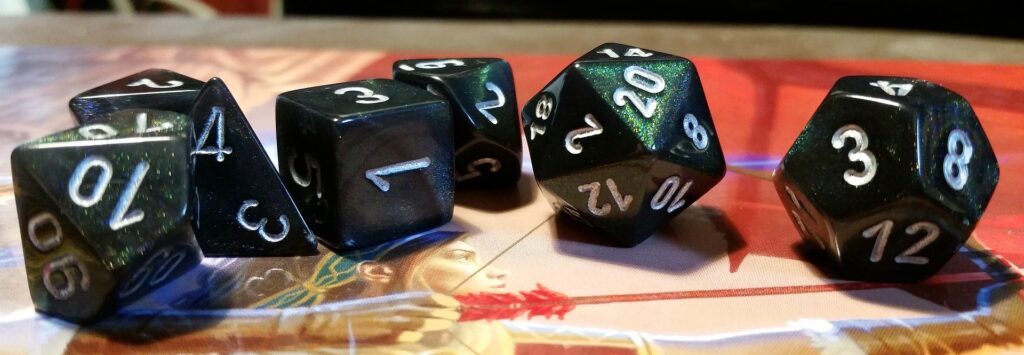
Dungeons and Dragons (DnD or D&D for short) has seen a recent resurgence over the past few years. In fact, since the release of the fifth edition—arguably Wizards of the Coast’s best edition—in 2014, sales have increased exponentially.
In an article on Bloomberg.com, Nathan Stewart, VP of Dungeons and Dragons at Wizards of the Coast, gave us a look into their sales numbers. “Sales of the fifth edition of the game… were up 41 percent in 2017 from the year before, and soared another 52 percent in 2018.”
What is Dungeons and Dragons?
At its core, Dungeons and Dragons is a ruleset that guides group storytelling through creative play and strategic problem-solving.
Most of us played imaginary games as children. I remember making construction paper bracers and a crown and pretending to be Wonder Woman. I would fly my invisible jet and trap bad guys in my Lasso of Truth (as long as they held still for me).
My fiance calls D&D a “ruleset for his imagination,” harkening back to the childhood games with his friends where rules were made up on the fly and you could be—and do—anything.
Wizards of the Coast (WotC), the company that publishes Dungeons and Dragons, says, “The core of D&D is storytelling. You and your friends tell a story together, guiding your heroes through quests for treasure, battles with deadly foes, daring rescues, courtly intrigue, and much more.”
It’s not quite that simple, of course. But even with the addition of races, classes, combat rules, conditions, spells, and XP, D&D really isn’t a difficult game to learn.
Aside from the storytelling and creative aspects, the main draw for me is that D&D is a game that, while easy to learn, is one you will never master. In fact, I’d argue that there is nothing to master.
You can learn the rules. You can memorize the Monster Manual and min-max for your character, playing only for the numbers. You could try to do the exact perfect thing at the exact perfect time. But, when you add the randomness of dice, the cleverness and creativity of the DM and your party, and the ongoing story, winning an encounter might not mean that you “win” the game.
In fact, in my experience, failure makes for the best stories.
Ultimately, the game is the amalgam of you and your friends. Of the imagination and passion for the story that you all share. Together.
The Role of the DM
One of the things you need to play D&D is a DM or Dungeon Master (some call them GMs or Game Masters). This person plays several roles in your game, and while many DMs will disagree on the details, most of us agree on the high level.
The referee. The DM is the ultimate authority in your game. They have the power to arbitrate rules and even homebrew, or create, their own. Most DMs run a combination of both. I play, for the most part, rules-as-written (RAW), but there are some things that I homebrew either to streamline gameplay or to maximize the “rule of cool.” (We play to be heroes. We should look, sound, and BE cool.)
As a writer I love to tell stories, to bring the details into vivid color, and to transport my players into a living world. I want them to feel their impact and to know that their choices have consequences. But, I can’t write the story for them. I can only provide the skeleton of the story—it is up to them to flesh it out with their characters and their choices. It is their story to tell.
The challenger. The campaign guide to WotC’s beginner adventure, Lost Mines of Phandelver, says that the DM “plays monsters.” I expand this part of a Dungeon Master’s role in my philosophy.
I believe that D&D campaigns should be about more than defeating monsters. It’s about overcoming challenges, whether they are monsters, people who act monstrously, traps, morally gray decisions, or changing an NPC’s (non-player character’s) mind for the greater good.
Some DMs take this duty to challenge their players to a greater extreme than I do. They have a more adversarial DMing style and take great pleasure in killing their players’ characters.
I don’t DM that way. I’ve killed players. In fact, I’ve TPKd (total-party kill) our entire group. I do want my players to be challenged and to fear they might die during an encounter. But that is never my ultimate goal. That isn’t our goal as a group. We’re there to tell a communal story, to explore our imaginations, and to have fun.
But one of the most beautiful things about D&D is that my way isn’t right and those other DM’s aren’t wrong. As long as our table is having fun, then that’s ok!
Want to Play Dungeons and Dragons?
In addition to a DM, all you need to play Dungeons and Dragons are character sheets, a set of polyhedral dice, the SRD (a free .pdf of the ruleset), a group of friends, and a chunk of time.
There are, of course, numerous other tools you can use from miniatures to dry erase map grids, dice cups to dice towers. While these tools can enhance your game, they truly aren’t necessary.
Whomever is acting as the DM should spend a little time preparing before-hand, but you don’t need to spend days and days doing so (but you will anyway). If you’re using a pre-written campaign, read it through at least once and prepare some light notes. If you’re homebrewing a campaign (something I don’t really recommend for first-time DMs), a bullet-point list of notes may be enough.
As you get more comfortable, you’ll find an organization style and a happy medium on how you spend your time.
I compulsively prepared for my very first session as DM. I literally spent days. But once I was comfortable, I was able to run a quick pick-up game for my fiance and kids as a Christmas Day activity. No prep at all. The story was neither deep nor serious—they woke up behind an old bar and built a ballista out of rubbage to skim their Tortle companion across a lake for a trophy.
The adventure, Lost Mines of Phandelver, included in the Starter Set was my first campaign as DM more than three years ago. I’ve now run it three separate times. I recommend getting together to create characters as a group—you’ll learn how the characters work and it will lead to easier gameplay and leveling later.
DnD has brought joy to so many. Want to play? Check your local game store to see if they run games locally. You can also find 5E groups on Facebook that can help you find a game.
Look into Roll20 or Fantasy Grounds for virtual play opportunities.
If you do give it a go, let me know how it went in the comments below. If you have any questions, I’ll try my best to answer them!
Geek Travel Guide sometimes uses affiliate links to fuel our coffee habit. Buy us a cup and get yourself something we love enough to recommend.

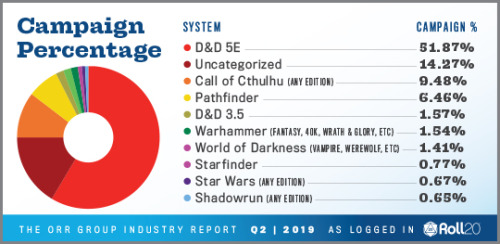
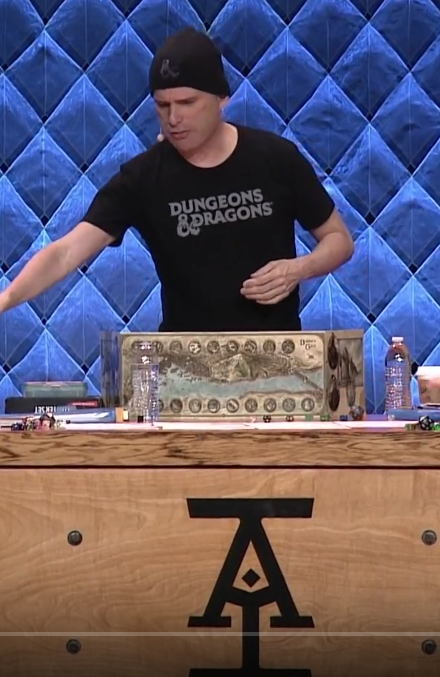
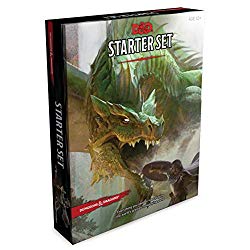
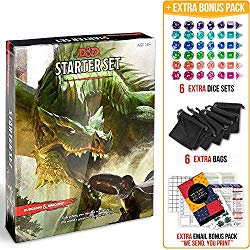
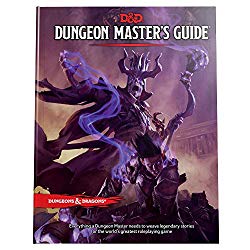
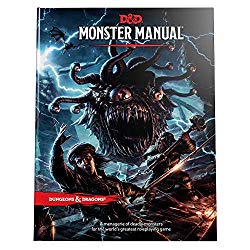
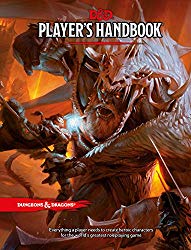
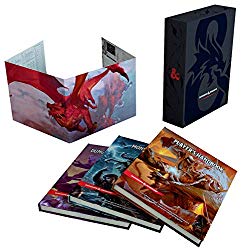
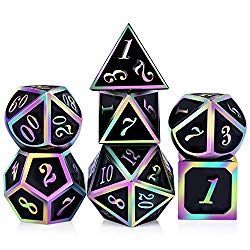
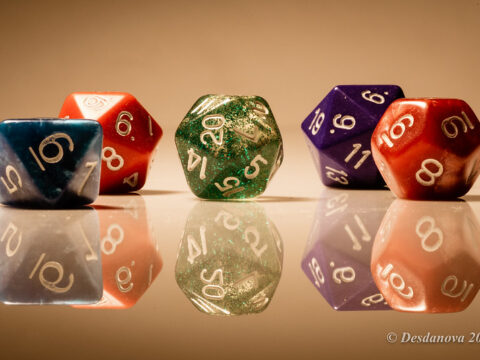
[…] you’re a hardcore Dungeons & Dragons player, you know that being unable to gather in the same space throws a wrench in your campaign. After […]